|
Thomas Dorn
Évjárat: 1970. augusztus
Futott km:
Karosszéria: Felújítás alatt
Leírás:
Futott km:
Karosszéria: Felújítás alatt
Leírás:
Az
autót Litvániából
szereztük egy kereskedőn keresztül, itt olvasható a
teljes történet. Az autó alvázszáma
12694, és kézi összerelesséle
készült 1970 augusztusában, mielőtt a VAZ-nál
elkezdőpdött a sorozatgyártás. Az
autó meglehetősen rossz állapotban van, mindenfelé
nem túl szakszerű javítások
nyomai és átfestések láthatók.
Teljes restaurálást kíván. Van
jónéhány
alkatrész, jel, ami csak a legkorábbi kézzel
szerelt zsigulik sajátja, pl. a
Magneti Marelli duda, a "Тольятти" feliratos orrembléma, a
furcsa motortér lámpa (lehet, hogy későbbi
beszerelés), a "шасси-chassis" feliart az
adattáblán (alvázat
jelent), és az 1970-es ablakok. Az
utastérlámpák Fiatok, de nem is akármiylen
Fiat, hanem Polski, ahogy valószínűleg az
ablaktörlők is. Ezeket hamarosan
szovjet, illetve az ablaktörlők esetében magyar
termékek váltották. További
tipikus korai jelek még a tűzfal közepébe
ütött alvázszám mellette az
adattáblával. A lökhárító
babák még nem ívesek, hanem kifejezett szöge
van a
törésüknek, az utastérbeli
kapaszkodóknak krómozott takaró végük
van. Ezek a
jelek megszűntek 1971 március-áprilisa után. Az
emelő zöld és a latin feliratok
tanúsága szerint Fiat vagy olasz gyártmány
lehet. Sajnos a textil szerszámos
hiányzik, az ablakmosó zacskó nem korhű
típus, és az egyik legszembetűnőbb
korai jel, a lámpafélholdak is hiányoznak,
valamint nincs benna kétrészes
ventilátor takaró lemez sem. Az AC és a
légszűrőházból kijövő levegőcső sem
gyári. További korai és nagyon korai Zsiguli jelek
a helyzetjelző a fehér index
búra alatt (ezért fehér), és a helyzetjelző
aljzat nélküli lámpafoncsor (a jobb
oldaliban cserélték, mivel benne van). A
sárvédőre szerelt háromszög talpú
kerek külső, és a fehér peremes belső
tükör, a ritka lyukas tetőkárpit, a
padlópedál,
az ezüst, vékony lámpás műszerfal, a
sűrűbordás műszerfalborítás az alumínium
díszítéssel, az ívesebb hátsó
ülés támla,a kürtkarikás kormány
a jobbra lévő
piros VAZ felirattal, a piperetükör a jobb oldali
napellenzőben, a füles
szellőzők, az ajtó oldalába benyomott
mélyedések, és a 2101-es hengerfej. Az
eredeti diagonál gumik és a gyári
szerelésnek megfelelő Videoton rádió a
hangszóróval tökéletes extrák.
The car was obtained from Lithuania via a dealer, here you can read the full story. The car has the chassis number 12694, and was produced by manual assembly in August 1970, before VAZ started serial production. The car is in pretty bad shape, repaired not very professionally in many places and over-painted all over. A full restoration is in order. It has a number of parts and marks which are only particular to the oldest hand made Zsigulis: the Magneti Marelli horns, the "Тольятти" emblem, the strange engine compartment light (it may be a later addition), the "шасси-chassis" text on the data table, and windows from 1970. The passenger compartment lights are Fiat, but not any Fiat, Polski Fiat! Most probably the wipers are also Polski Fiat. These soon became soviet or as the wipers, Hungarian products. Other typical early marks: VIN in the middle of the firewall, not at the right side, VIN plate next to it. The bumper "bumps" are not curvy but has an obvious angle. The handles inside has chrome-plated tips. These are the marks discontinued after March-April 1971. The hoist is green (not black) and it is most probably Fiat or Italian as there is latin text on it. Unfortunately the textile tool bag is missing, the windscreen washer's bag is not the right type, and one of the most visible 1970-71 summer sign, the semicircular chrome rims around the front lights are missing, and the cooling fan's two piece cover is also not there. The AC pump and the ventilation tube coming from the air filter housing is not original either. Other very early and early marks include park light in the white blinker (that is why it is white), and main lights without the socket for park lights, (however the right light is with a socket for park light). The round mirrors fixed on its triangular base to the fender instead of the door, the white rimmed internal mirror, the sparse patterned roof coverage, the floor mounted pedal, the silver gauge board with the narrow slits for control lights, the dense stripes on the dashboard and the aluminium inner trim, the curvy back seat, the horn rim and the red VAZ text to the right on the steering wheel, the mirror in the sun deflector, the little handles on the ventilation shaft covers, the two depression on the front doors' narrow side, the 2101 cylinder head. The original cross-ply tires and the original Videoton radio+speaker are a great extra.
The car was obtained from Lithuania via a dealer, here you can read the full story. The car has the chassis number 12694, and was produced by manual assembly in August 1970, before VAZ started serial production. The car is in pretty bad shape, repaired not very professionally in many places and over-painted all over. A full restoration is in order. It has a number of parts and marks which are only particular to the oldest hand made Zsigulis: the Magneti Marelli horns, the "Тольятти" emblem, the strange engine compartment light (it may be a later addition), the "шасси-chassis" text on the data table, and windows from 1970. The passenger compartment lights are Fiat, but not any Fiat, Polski Fiat! Most probably the wipers are also Polski Fiat. These soon became soviet or as the wipers, Hungarian products. Other typical early marks: VIN in the middle of the firewall, not at the right side, VIN plate next to it. The bumper "bumps" are not curvy but has an obvious angle. The handles inside has chrome-plated tips. These are the marks discontinued after March-April 1971. The hoist is green (not black) and it is most probably Fiat or Italian as there is latin text on it. Unfortunately the textile tool bag is missing, the windscreen washer's bag is not the right type, and one of the most visible 1970-71 summer sign, the semicircular chrome rims around the front lights are missing, and the cooling fan's two piece cover is also not there. The AC pump and the ventilation tube coming from the air filter housing is not original either. Other very early and early marks include park light in the white blinker (that is why it is white), and main lights without the socket for park lights, (however the right light is with a socket for park light). The round mirrors fixed on its triangular base to the fender instead of the door, the white rimmed internal mirror, the sparse patterned roof coverage, the floor mounted pedal, the silver gauge board with the narrow slits for control lights, the dense stripes on the dashboard and the aluminium inner trim, the curvy back seat, the horn rim and the red VAZ text to the right on the steering wheel, the mirror in the sun deflector, the little handles on the ventilation shaft covers, the two depression on the front doors' narrow side, the 2101 cylinder head. The original cross-ply tires and the original Videoton radio+speaker are a great extra.
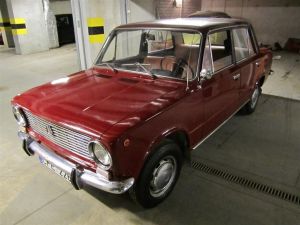
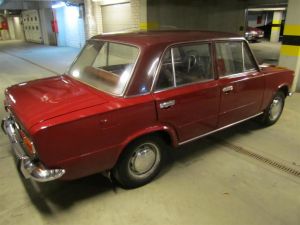
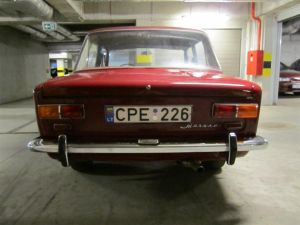
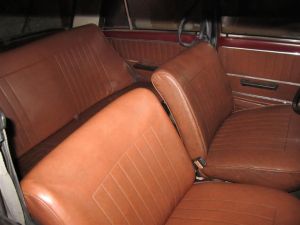
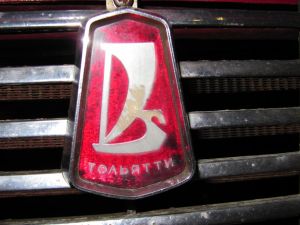
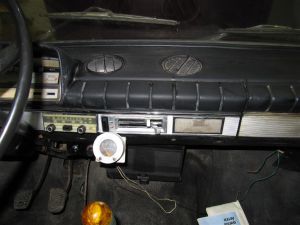
Kép album (Klikk ide)
Zsiguli 2103 1500cm3
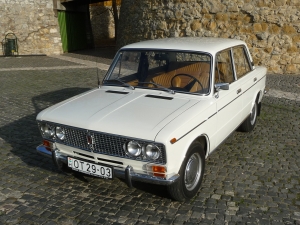
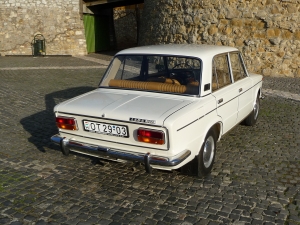
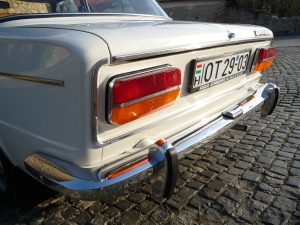
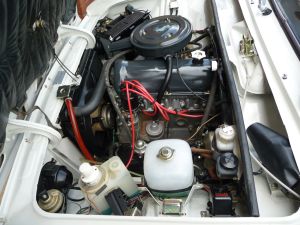
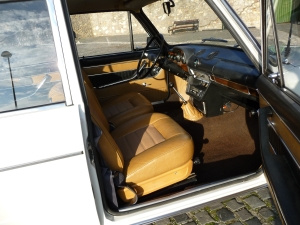
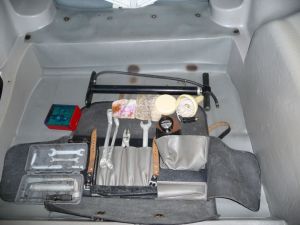
Évjárat: 1978.
Futott km: 32000 km
Karosszéria: Felújított
Leírás:
Futott km: 32000 km
Karosszéria: Felújított
Leírás:
32
000 km-t futott,
magyarországi veterán vizsgával rendelkező
gyári állapotra felújított
autó. Egy pécsi ügyvéd úré volt
30 évig az autó, aki nagyon ritkán
használta. 2000-től már nem vezethetett, de az
autóhoz nagyon
ragaszkodott, így egy fűtött garázsban állt
használaton kívül. Sajnos egy ideig
a garázsban macskákat is tartottak, ami nagyon
"mély nyomokat"
hagyott az autó fényezésén, és a
króm alkatrészek egy részén. Vukmann Attila
2008-ban vásárolta meg, és újította
fel. Ami
szükséges volt az aprólékosan,
precízen került felújításra,
cserére. A gyári
megjelenés érdekében újra lett
fényezve, fehér színű
alvázvédelemet, és
üregvédelemet kapott. Minden alkatrész CCCP-s
(USSR), még a gumik is. A
középkonzolba az üzembe helyezéskor beszerelt
korabeli két nyomógombos Videoton
rádió a konzolba épített
hangszóróval még ma is működőképes.
Az autó megvásárlásakor nem volt egyértelműen bizonyítható a kilométeróra által mutatott 30 760 km, de a tulajdonos hozzátartozói, és az autó öreg szerelője (aki végig szervizelte) állította, hogy tényleg keveset futott. Az alapos tisztítás után lehetett látni, hogy az utastérben a szőnyegek, ülések nem kopottak, hibamentesek, varrások folytonosak.
Merkur papírt, szerviz számlákat, biztosítási kötvényeket, garázs bérleti díjról szóló csekkeket is megőrizte a bácsi. A szerszámos táska is újnak tűnik, és szinte minden szerszám megvan. Eredeti szürke forgalmit is vissza tudta adni a hatóság a veterán vizsgát követően.
2011. októberében vásároltam meg Attilától az autót. Amellett, hogy a fotók után élőben is meggyőzően szép volt az autó, akkor vált véglegessé vásárlási szándékom, amikor minden papír rendelkezésre állt, ami az autó történetét, eredetét bizonyította.
Amint az időjárás engedi, már az új otthonában készült képeket fogok küldeni.
32000 km in the tachometer, a Hungarian historic qualification are the attributes of this fully restored car. It belonged to a lawyer from Pécs, Hungary for 30 years, who used it rarely. He could not drive since 2000, but he was very keen on the car, he kept it in a heated garage unused, Unfortunately cats were also kept in the same garage which left deep scratches on the paintings and some of the chromed parts. Vukmann Attila bought it in 2008 and restored it. Whatever was needed was renewed in detail, all parts used were marked CCCP (USSR), even the tyres. It was repainted for factory appearance and got a new white undercoat. The dual buttoned Videoton radio which was equipped to the car at the first registration is still operational.
When the car was purchased there was no obvious proof for the 30760 km shown on the tachometer, but the family f the owner and the old mechanic who serviced the car confirmed it. After thorough cleaning it was visible that the carpets are spotless and the sewings are continuous.
The documents from Merkúr (the car trade monopoly of communist Hungary), service invoices, garage rental checks were also kept by the elderly gentleman. the tool bag is like new and almost al tools are in it. We have the original greybook, the car registry document. I bought the car in 2011 from Attila. It was very convincing on the photos and it was nice when I see it live, but my intent to purchase turned final when I saw the original documents, which were proof for the origin and history of the car. As soosn as wheather permits I will post new pictures about the car in it new home.
Az autó megvásárlásakor nem volt egyértelműen bizonyítható a kilométeróra által mutatott 30 760 km, de a tulajdonos hozzátartozói, és az autó öreg szerelője (aki végig szervizelte) állította, hogy tényleg keveset futott. Az alapos tisztítás után lehetett látni, hogy az utastérben a szőnyegek, ülések nem kopottak, hibamentesek, varrások folytonosak.
Merkur papírt, szerviz számlákat, biztosítási kötvényeket, garázs bérleti díjról szóló csekkeket is megőrizte a bácsi. A szerszámos táska is újnak tűnik, és szinte minden szerszám megvan. Eredeti szürke forgalmit is vissza tudta adni a hatóság a veterán vizsgát követően.
2011. októberében vásároltam meg Attilától az autót. Amellett, hogy a fotók után élőben is meggyőzően szép volt az autó, akkor vált véglegessé vásárlási szándékom, amikor minden papír rendelkezésre állt, ami az autó történetét, eredetét bizonyította.
Amint az időjárás engedi, már az új otthonában készült képeket fogok küldeni.
32000 km in the tachometer, a Hungarian historic qualification are the attributes of this fully restored car. It belonged to a lawyer from Pécs, Hungary for 30 years, who used it rarely. He could not drive since 2000, but he was very keen on the car, he kept it in a heated garage unused, Unfortunately cats were also kept in the same garage which left deep scratches on the paintings and some of the chromed parts. Vukmann Attila bought it in 2008 and restored it. Whatever was needed was renewed in detail, all parts used were marked CCCP (USSR), even the tyres. It was repainted for factory appearance and got a new white undercoat. The dual buttoned Videoton radio which was equipped to the car at the first registration is still operational.
When the car was purchased there was no obvious proof for the 30760 km shown on the tachometer, but the family f the owner and the old mechanic who serviced the car confirmed it. After thorough cleaning it was visible that the carpets are spotless and the sewings are continuous.
The documents from Merkúr (the car trade monopoly of communist Hungary), service invoices, garage rental checks were also kept by the elderly gentleman. the tool bag is like new and almost al tools are in it. We have the original greybook, the car registry document. I bought the car in 2011 from Attila. It was very convincing on the photos and it was nice when I see it live, but my intent to purchase turned final when I saw the original documents, which were proof for the origin and history of the car. As soosn as wheather permits I will post new pictures about the car in it new home.

























